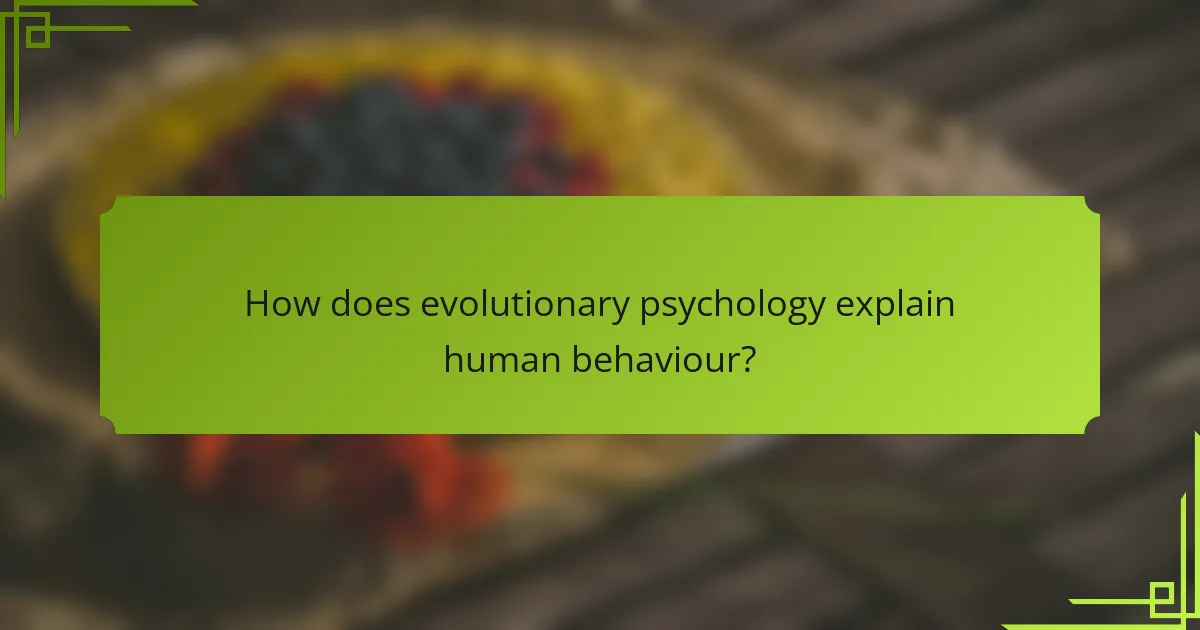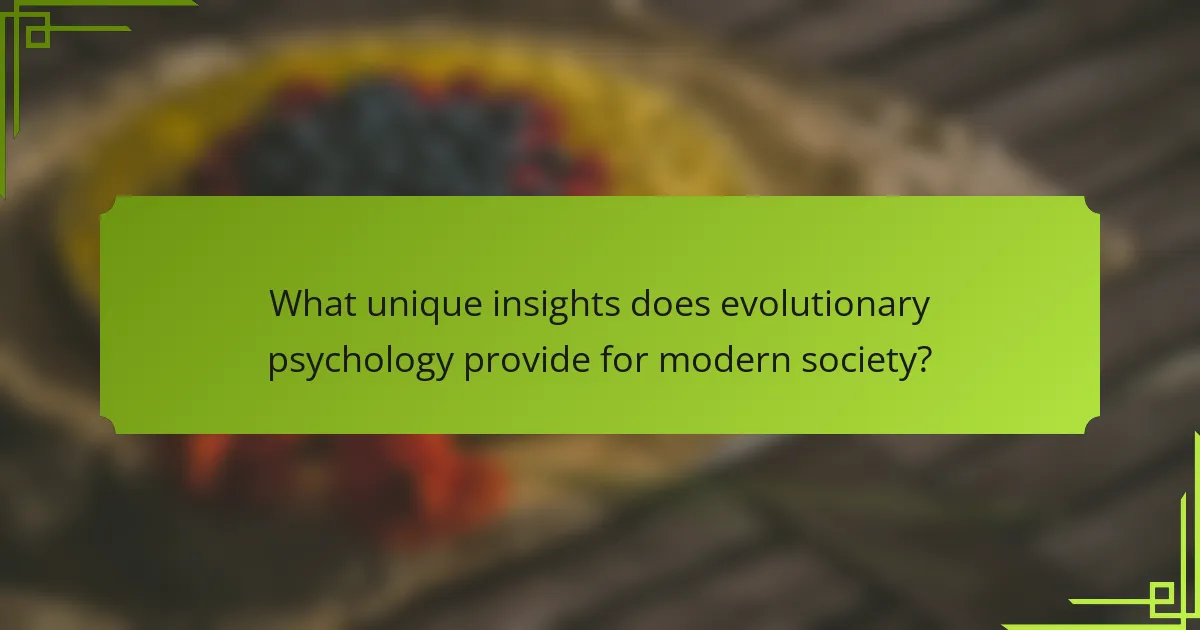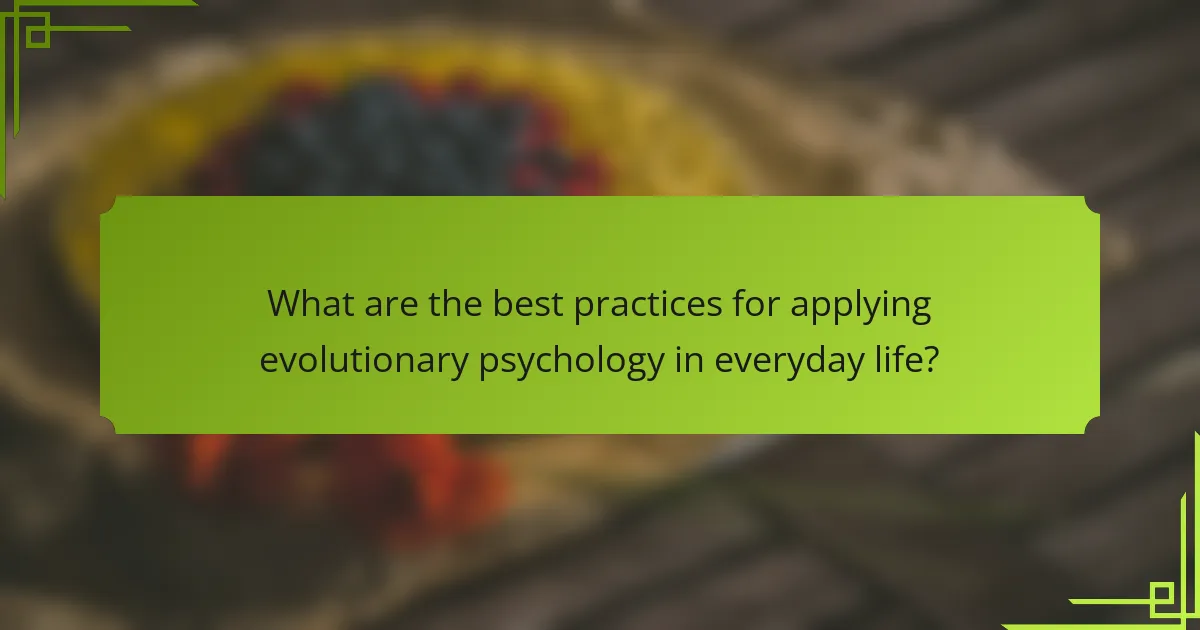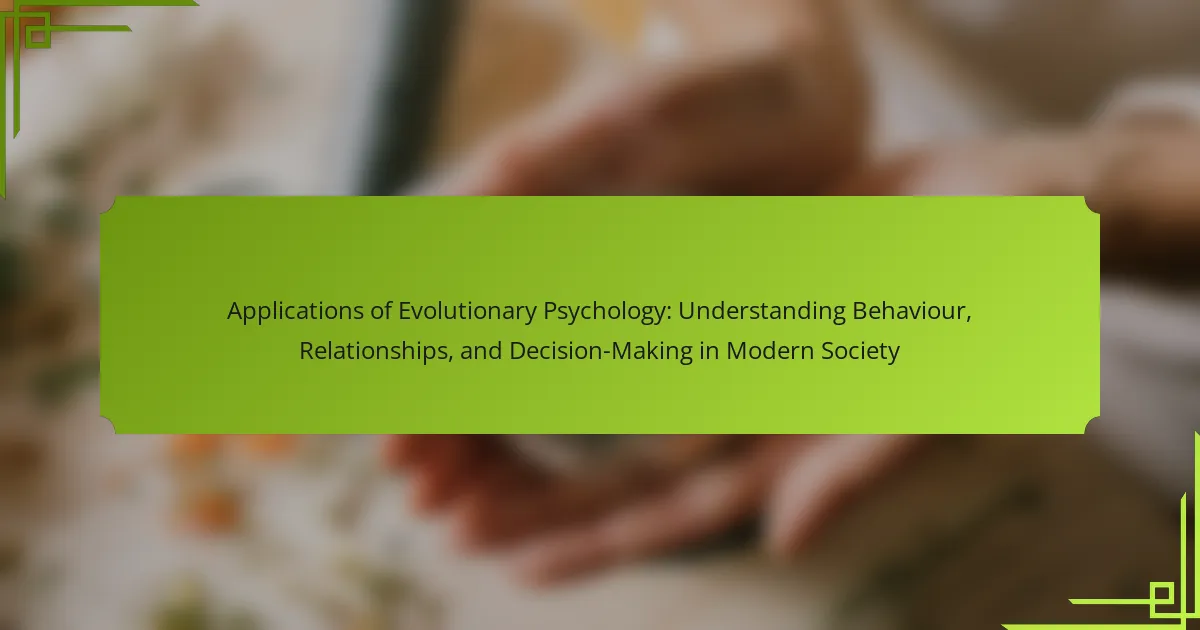Understanding the applications of evolutionary psychology can enhance insights into behaviour, relationships, and decision-making in modern society. This field reveals how ancestral survival strategies influence mate selection and social cooperation. It also explains cognitive biases and emotional responses that shape interpersonal dynamics. By applying these insights, individuals can improve their relationships and navigate social environments more effectively.

How does evolutionary psychology explain human behaviour?
Evolutionary psychology explains human behaviour as a result of adaptive processes shaped by natural selection. It emphasizes that many behaviours, such as mate selection and social cooperation, are influenced by ancestral survival strategies. This perspective reveals how evolutionary pressures impact modern decision-making and relationship dynamics. For example, people often exhibit preferences for traits that signal reproductive fitness, such as physical attractiveness or resource availability. Understanding these evolutionary roots can enhance insights into contemporary social behaviours and interpersonal relationships.
What are the foundational principles of evolutionary psychology?
The foundational principles of evolutionary psychology include the idea that human behaviour is shaped by evolutionary processes. These principles suggest that many psychological traits are adaptive responses to environmental challenges. Key concepts include the notion of natural selection, which posits that behaviours promoting survival and reproduction are favoured, and the importance of evolved psychological mechanisms that influence social behaviours, mate selection, and decision-making. These principles help explain complex human interactions and societal structures through the lens of evolutionary adaptations.
How does evolutionary psychology relate to decision-making?
Evolutionary psychology significantly influences decision-making by highlighting innate behaviours shaped by survival needs. This perspective reveals that choices often stem from ancestral adaptations, such as risk assessment and social cooperation. For example, humans may prioritise group cohesion due to evolutionary benefits in resource sharing. Understanding these patterns can enhance modern decision-making strategies in various fields, including marketing and conflict resolution.
What cognitive biases are influenced by evolutionary factors?
Evolutionary factors significantly influence cognitive biases, shaping our decision-making and social interactions. These biases, such as confirmation bias and status quo bias, have roots in survival and reproductive advantages. For example, confirmation bias helps individuals reinforce beliefs that align with their experiences, promoting social cohesion. Status quo bias favours maintaining current conditions, which historically enhanced group stability. Understanding these biases through an evolutionary lens reveals their adaptive significance in modern society.
What role does evolutionary psychology play in interpersonal relationships?
Evolutionary psychology significantly influences interpersonal relationships by explaining behaviours rooted in survival and reproduction. It posits that many relationship dynamics stem from innate instincts shaped over millennia. Understanding these instincts can enhance communication and conflict resolution among partners. For example, attachment styles often reflect evolutionary adaptations for securing mates and ensuring offspring survival. Recognising these patterns allows individuals to navigate relationships more effectively, fostering deeper connections and reducing misunderstandings.
How do attachment styles relate to evolutionary psychology?
Attachment styles significantly influence human behaviour and relationships, reflecting evolutionary adaptations for survival. These styles, shaped by early interactions, impact mate selection and social bonding. For example, secure attachment fosters trust and cooperation, enhancing reproductive success. In contrast, anxious or avoidant styles may lead to maladaptive behaviours, affecting relationship stability. Understanding these dynamics through an evolutionary lens reveals the underlying motives driving modern social interactions.
What are the universal attributes of evolutionary psychology?
Evolutionary psychology examines universal attributes that shape human behaviour, relationships, and decision-making. These attributes include adaptive behaviours, mate selection criteria, social bonding mechanisms, and cognitive biases. Adaptive behaviours, such as cooperation and competition, enhance survival and reproductive success. Mate selection criteria often prioritise traits linked to genetic fitness. Social bonding mechanisms, like attachment styles, facilitate group cohesion. Cognitive biases, including confirmation bias, influence decision-making processes. Each attribute reflects underlying evolutionary pressures, providing insights into modern human interactions.
How does evolutionary psychology shape social norms?
Evolutionary psychology significantly influences social norms by shaping behaviours that promote survival and reproduction. It explains how innate tendencies affect societal expectations and interpersonal relationships. For example, cooperation and altruism are often rooted in evolutionary adaptations that enhance group survival. These behaviours manifest as norms that dictate acceptable social conduct. Additionally, evolutionary psychology provides insights into gender roles, mating strategies, and parental investment, further solidifying the framework of social norms. Understanding these influences helps to decode modern societal behaviours and decision-making processes.

What unique insights does evolutionary psychology provide for modern society?
Evolutionary psychology offers unique insights into human behaviour, relationships, and decision-making by revealing innate predispositions shaped by survival and reproduction. These insights help explain social dynamics, mate selection, and conflict resolution in modern society. For instance, understanding the evolutionary basis of jealousy can improve interpersonal relationships by fostering empathy. Additionally, recognising cognitive biases rooted in evolutionary adaptations can enhance decision-making processes in personal and professional contexts. Overall, these insights provide a deeper understanding of human nature, guiding individuals in navigating complex social environments.
How can evolutionary psychology inform conflict resolution in relationships?
Evolutionary psychology can enhance conflict resolution in relationships by providing insights into underlying behavioural patterns. Understanding these patterns helps individuals identify triggers and motivations that lead to conflicts.
For instance, evolutionary psychology suggests that certain behaviours stem from ancestral survival strategies, such as competition for resources or mate selection. Recognising these instincts allows partners to approach conflicts more empathetically, facilitating better communication.
Moreover, evolutionary principles can guide the development of conflict resolution strategies tailored to individual relationship dynamics. Couples can learn to navigate disagreements by understanding their evolutionary predispositions, fostering cooperation and reducing misunderstandings.
Ultimately, applying evolutionary psychology in conflict resolution encourages a deeper awareness of each partner’s needs, leading to healthier, more resilient relationships.
What are the unique applications of evolutionary psychology in marketing?
Evolutionary psychology offers unique applications in marketing by revealing deep-seated human behaviours and preferences. Marketers can leverage insights into innate desires, such as social status and security, to craft compelling campaigns.
For example, understanding the evolutionary basis of fear can enhance advertising strategies by creating urgency. Additionally, using principles of mate selection can inform branding, making products more appealing through perceived desirability.
Furthermore, marketers can utilise the concept of reciprocity, rooted in evolutionary psychology, to build customer loyalty and foster relationships. By offering value first, brands can trigger a natural inclination to reciprocate, enhancing customer engagement.
Overall, applying evolutionary psychology principles enables marketers to connect with consumers on a fundamental level, driving effective decision-making and brand loyalty.
How do evolutionary principles influence consumer behaviour?
Evolutionary principles significantly shape consumer behaviour by influencing preferences and decision-making processes. These principles suggest that behaviours have evolved to maximise survival and reproductive success, which translates into modern consumer choices.
For example, humans are wired to seek out resources that enhance their status or well-being. This drives demand for luxury goods, as they signal social standing. Additionally, evolutionary psychology posits that consumers are drawn to products that promise health benefits, reflecting innate survival instincts.
Moreover, scarcity influences perception; limited availability triggers urgency, aligning with an evolutionary bias towards acquiring rare resources. This principle explains why marketing strategies often emphasise exclusivity.
Finally, social proof plays a crucial role, as individuals tend to follow the behaviours of others, rooted in the evolutionary need for social cohesion and acceptance. Understanding these principles allows marketers to tailor strategies that resonate with innate consumer instincts.
What are the rare attributes of evolutionary psychology’s applications?
The rare attributes of evolutionary psychology’s applications include its focus on ancestral environments, the integration of biological and cultural evolution, and its ability to predict modern behavioural trends based on evolutionary past. These attributes highlight unique insights into human behaviour that are not commonly addressed in other psychological frameworks.
What uncommon perspectives does evolutionary psychology offer on mental health?
Evolutionary psychology provides unique insights into mental health by framing psychological issues as adaptations to ancestral environments. This perspective emphasizes the role of evolved mechanisms in shaping behaviours related to anxiety, depression, and social interactions.
For example, understanding anxiety through an evolutionary lens suggests it may have developed as a survival mechanism, alerting individuals to potential threats. This view contrasts with purely biological or social explanations, offering a more integrated understanding of mental health issues.
Moreover, evolutionary psychology highlights the importance of social bonds and relationships in mental well-being. It posits that our need for social connection is rooted in survival, influencing our emotional health and resilience.
In addition, this approach encourages examining how modern lifestyles may clash with evolved psychological traits, contributing to mental health challenges. By identifying these mismatches, individuals can develop strategies for coping and improving their mental health.
How can understanding evolutionary psychology improve personal development?
Understanding evolutionary psychology enhances personal development by revealing the roots of behaviour and decision-making. This insight allows individuals to identify patterns, improve relationships, and make informed choices. Recognising innate drives, such as survival and social bonding, can lead to better self-awareness and emotional intelligence. As a result, individuals can align their goals with evolutionary principles, fostering personal growth and resilience. Understanding these dynamics can also aid in conflict resolution and enhance interpersonal communication.

What are the best practices for applying evolutionary psychology in everyday life?
To apply evolutionary psychology effectively in everyday life, focus on understanding innate behaviours and motivations. Recognising how evolutionary influences shape decision-making can enhance personal relationships and improve conflict resolution.
1. Acknowledge the role of evolutionary instincts in social dynamics; this fosters empathy and cooperation.
2. Utilise knowledge of mate selection criteria to enhance romantic relationships, aligning with biological predispositions.
3. Apply insights from evolutionary psychology to improve negotiation skills by understanding underlying human drives.
4. Reflect on how ancestral environments influence modern behaviour, enabling better self-awareness and personal growth.
What common mistakes should be avoided when using evolutionary psychology?
To avoid common mistakes in evolutionary psychology, focus on evidence-based applications and refrain from overgeneralising findings. Misinterpretation of evolutionary concepts can lead to flawed conclusions about human behaviour. Additionally, neglecting cultural and social influences while emphasizing biological determinism can distort understanding. Lastly, be cautious of using anecdotal evidence instead of robust scientific data, as this undermines the credibility of the analysis.
How can insights from evolutionary psychology enhance relationship dynamics?
Insights from evolutionary psychology can significantly enhance relationship dynamics by providing a deeper understanding of human behaviour. These insights reveal how innate drives and social structures influence partner selection, communication styles, and conflict resolution. For example, recognising the evolutionary basis for jealousy can help partners address insecurities constructively. Additionally, understanding attachment styles rooted in evolutionary history can improve emotional bonds and intimacy. By applying these principles, individuals can navigate relationship challenges more effectively, fostering healthier interactions and stronger connections.
What actionable strategies can individuals implement based on evolutionary psychology?
Individuals can implement strategies based on evolutionary psychology to enhance their decision-making and relationships. Understanding innate behaviours helps in recognising patterns in social interactions.
1. Leverage social proof by observing group behaviours to inform personal choices.
2. Utilise the concept of reciprocity to build stronger relationships through mutual exchanges.
3. Recognise and manage cognitive biases that stem from evolutionary adaptations, such as confirmation bias.
4. Apply the understanding of mate selection principles to improve romantic relationships and partner compatibility.
5. Foster resilience by acknowledging the evolutionary basis of stress responses and developing coping strategies.
